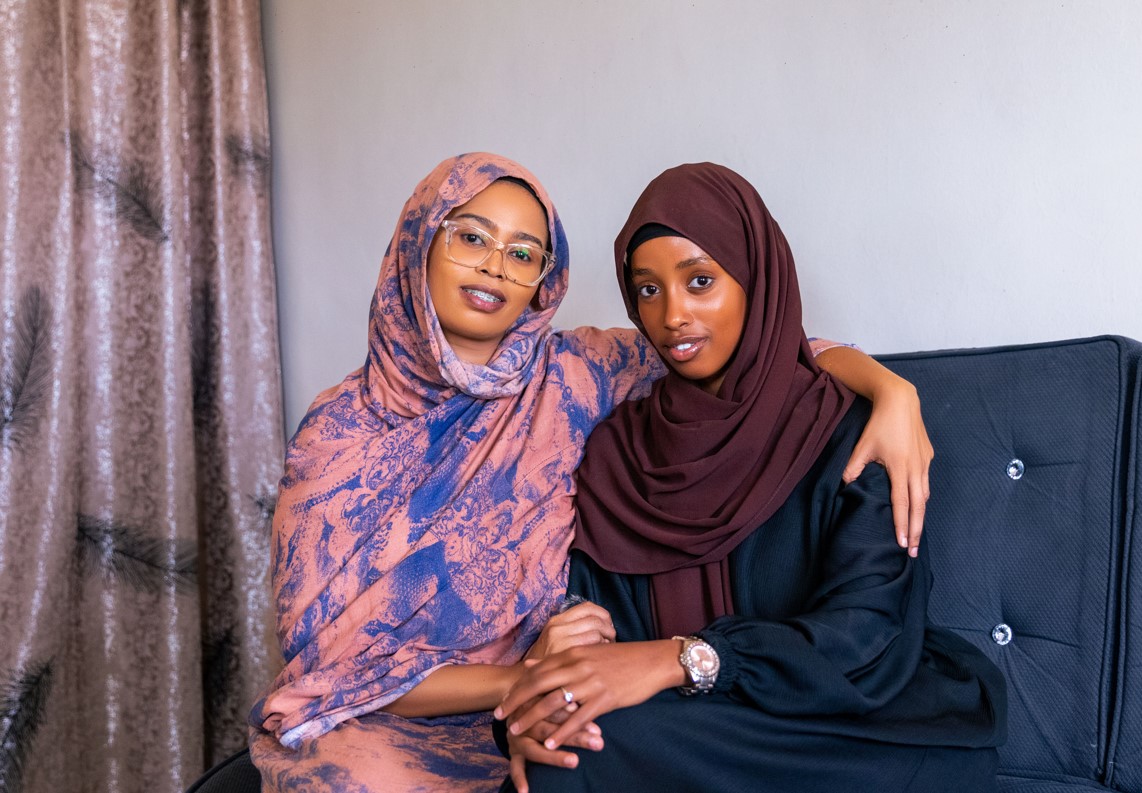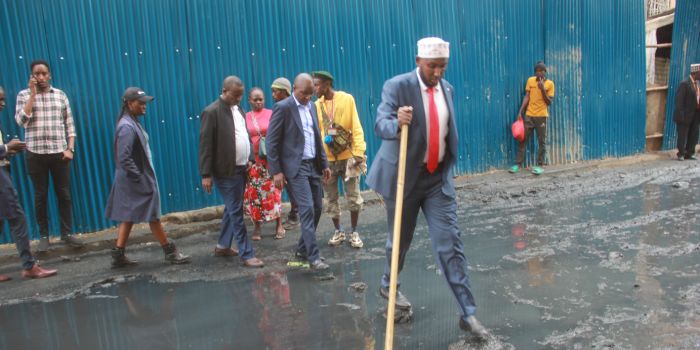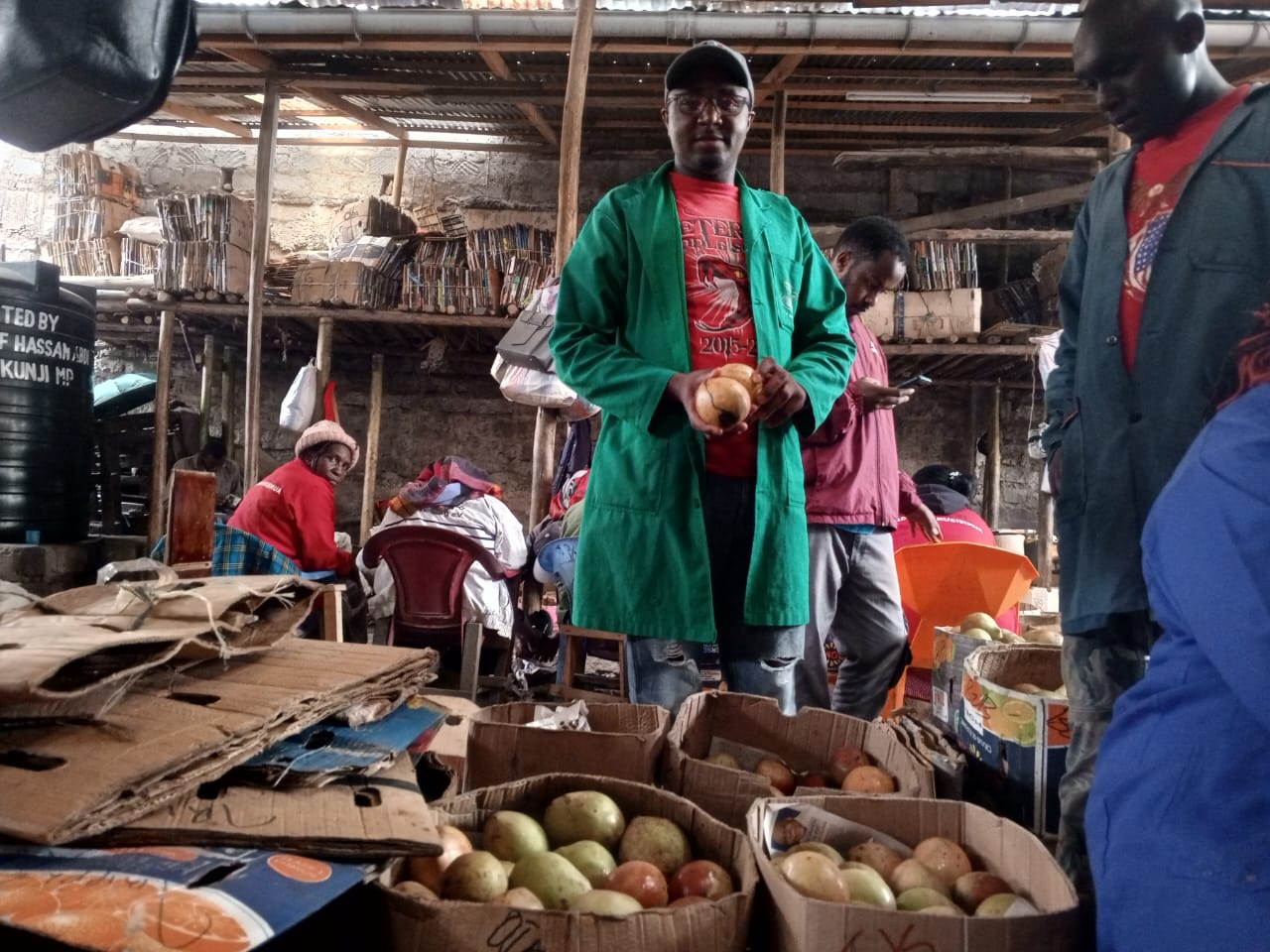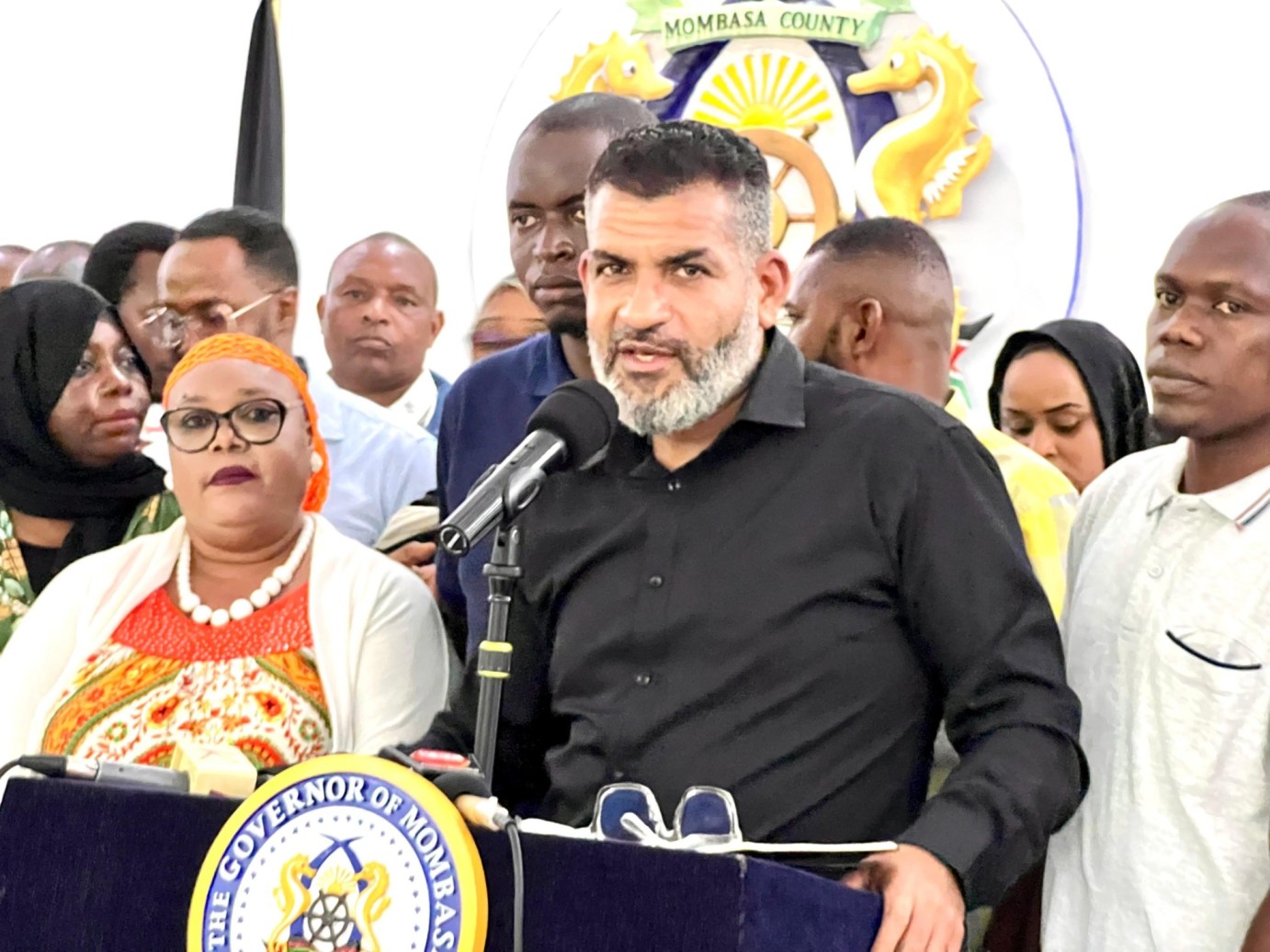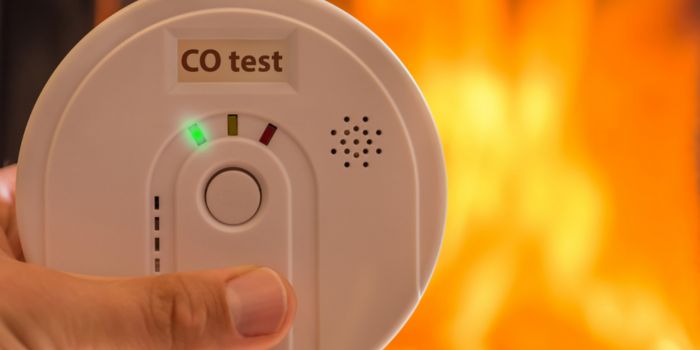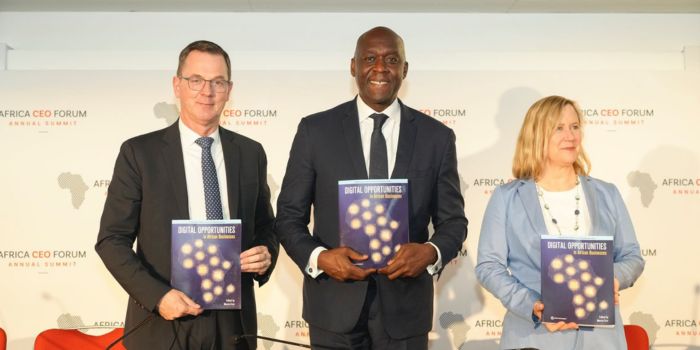Mombasa entrepreneur transforms coconut shells into profitable household items
By Mishi Gongo |
An accident in 2017 ended Collins Otieno's career as a PSV driver, so he turned to the use of coconut shells to make household items for sale.
Former passenger service vehicle (PSV) driver Collins Otieno brings to life the saying that necessity is the month of invention.
An accident in 2017 ended his career as a driver, so he turned to the use of coconut shells to make household items for sale.
He had no experience, so he practised, and is now skilled at making items including sugar dishes, soap dishes, toothbrush holders, pen holders, drinking glasses, doormats, and flower vases.
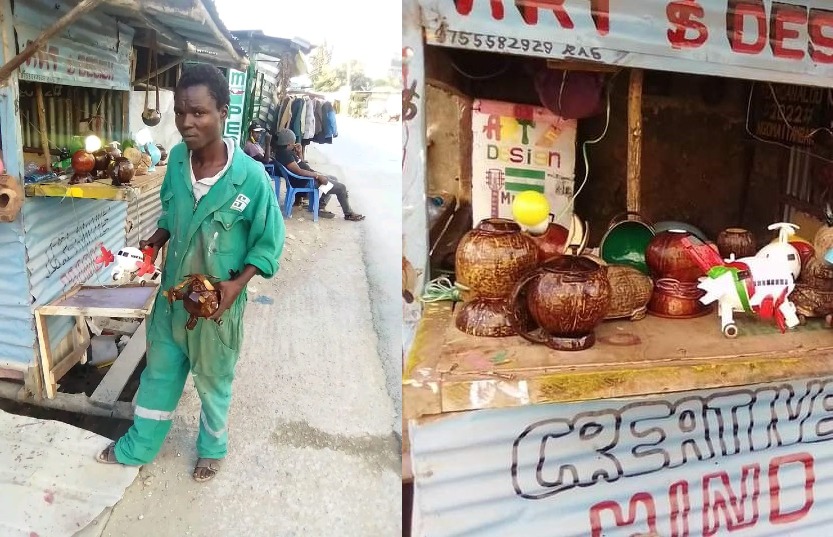 This combination picture shows Mombasa entrepreneur Collins Otieno next to his shop, called the Creative Mind, in Mikindani, following an interview with The Eastleigh Voice on March 17, 2024. (Photos: Mishi Gongo)
This combination picture shows Mombasa entrepreneur Collins Otieno next to his shop, called the Creative Mind, in Mikindani, following an interview with The Eastleigh Voice on March 17, 2024. (Photos: Mishi Gongo)Otieno now has a steady stream of customers who appreciate the unique designs he comes up with at his shop called the "Creative Mind".
"I had just started a family when I was involved in an accident in 2017. I was left with a broken leg that made it impossible for me to drive again. I had to look for other means to earn a living," he says.
 Some of the household items created by entrepreneur Collins Otieno, who runs a business called the Creative Mind in Mikindani, Mombasa County, as pictured on March 17, 2024. (Photos: Mishi Gongo)
Some of the household items created by entrepreneur Collins Otieno, who runs a business called the Creative Mind in Mikindani, Mombasa County, as pictured on March 17, 2024. (Photos: Mishi Gongo)The 34-year-old said he was devastated, as driving was his only source of livelihood.
“Driving was my only source of livelihood, so the news hit me hard considering I had just gotten a baby, and efforts to seek employment bore no fruit since nobody wanted a crippled person. I was using crutches then,” he says.
One day, as he sunbathed outside his home in Mikindani, Mombasa County, he saw kids playing with coconut shells.
"They would nail them to make wheels for their stick cars, and that is where my idea of making home items using the waste was born," he tells The Eastleigh Voice.
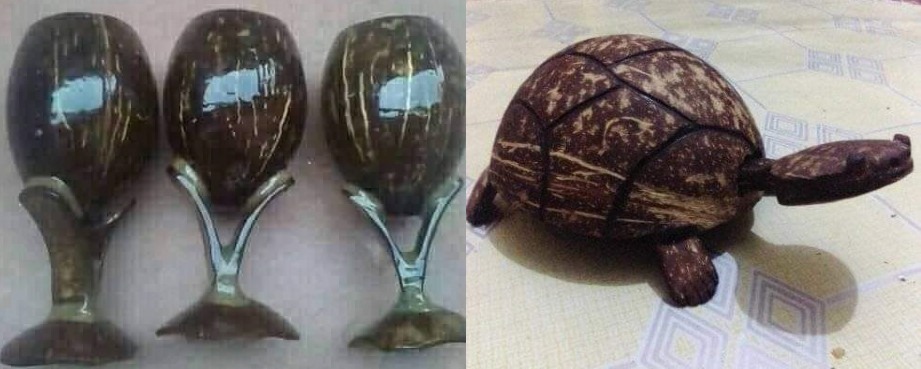 Some of the household items created by entrepreneur Collins Otieno, who runs a business called the Creative Mind in Mikindani, Mombasa County, as pictured on March 17, 2024. (Photos: Mishi Gongo)
Some of the household items created by entrepreneur Collins Otieno, who runs a business called the Creative Mind in Mikindani, Mombasa County, as pictured on March 17, 2024. (Photos: Mishi Gongo)Unlike many who consider coconut husks and shells trash, Otieno found in them an opportunity to make money.
He admits that it was hard at first since he lacked the skills, but after a short period of trial and error, he made his first soap dish, which he sold for Sh350. His pieces fetch between Sh250 and Sh1,000, depending on the effort that goes into them.
“The person who bought my first piece was impressed with the design, and even placed more orders,” he says.
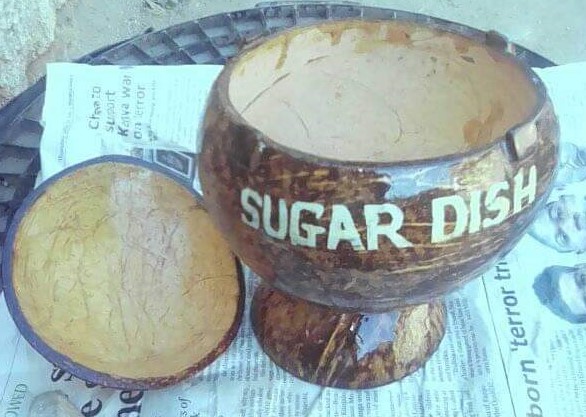 A sugar dish created by entrepreneur Collins Otieno, who runs a business called the Creative Mind in Mikindani, Mombasa County, in this picture taken on March 17, 2024. (Photo: Mishi Gongo)
A sugar dish created by entrepreneur Collins Otieno, who runs a business called the Creative Mind in Mikindani, Mombasa County, in this picture taken on March 17, 2024. (Photo: Mishi Gongo)Otieno says it takes him a minimum of a month and a maximum of four months to finish a product, depending on the size.
“I clean the shells manually using sandpaper and a knife to scrub, so it takes time and a lot of effort to complete."
He explained that his day starts at six in the morning when he collects the raw materials. He then does the cleaning to get rid of impurities, starting with water followed by sandpaper. Once smooth, he uses a hacksaw to cut the material into the desired shapes.
“I sometimes hire a friend to assist me with the scrubbing, I use super glue to join the pieces that I have cut, and once I am done, I apply varnish to the pieces and sometimes paint them depending on the customer's request,” he narrates.
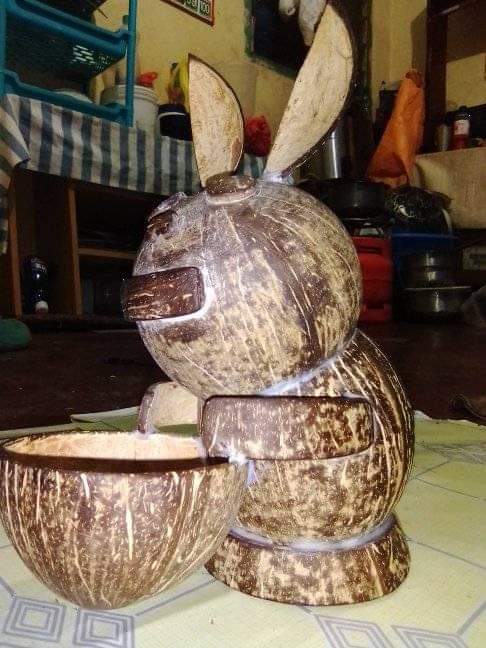 A household item created by entrepreneur Collins Otieno, who runs a business called the Creative Mind in Mikindani, Mombasa County, in this picture taken on March 17, 2024. (Photo: Mishi Gongo)
A household item created by entrepreneur Collins Otieno, who runs a business called the Creative Mind in Mikindani, Mombasa County, in this picture taken on March 17, 2024. (Photo: Mishi Gongo)Currently, he uses a hacksaw, super glue, paint, a knife and dust to make and decorate his items, but he hopes he will soon be able to purchase a machine to make his work easier.
On a good day, Otieno said, he sells up to six pieces, while on a bad day, he sells just a piece or two.
“My business gives me an income and, at the same time, helps conserve the environment. My wish is to get a well-wisher to buy me a machine that will allow me to make more pieces,” he said.
Otieno explained that, due to his fractured leg, he uses his Facebook page to market his pieces.
“I use crutches, so hawking my products is not possible. I advertise online and do deliveries at a small fee when a client who cannot come to my shop makes an order,” he says, adding that he targets both local and foreign customers.
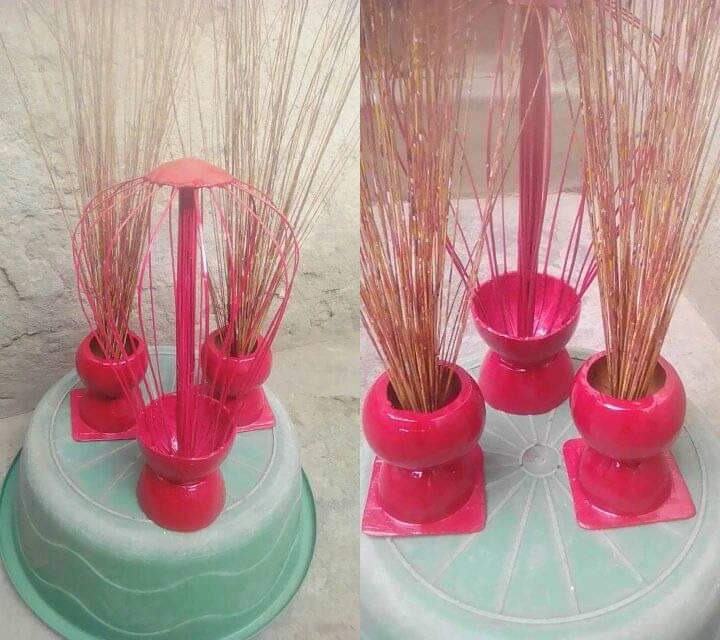 Some of the household items created by entrepreneur Collins Otieno, who runs a business called the Creative Mind in Mikindani, Mombasa County, as pictured on March 17, 2024. (Photos: Mishi Gongo)
Some of the household items created by entrepreneur Collins Otieno, who runs a business called the Creative Mind in Mikindani, Mombasa County, as pictured on March 17, 2024. (Photos: Mishi Gongo)The entrepreneur's challenges include some customers' refusal to pay once the products are delivered, or their failure to collect finished items.
“It is hard to tell genuine customers from fraudulent ones, but I am working on improving my services,” he says.
His advice to the many youths who complain of unemployment is to be critical thinkers and stop waiting for white-collar jobs.
“There are many opportunities in our country. What the youth need to do is go out of their way to discover income-generating opportunities and avoid shying away from jobs seen as less prestigious,” he says.



